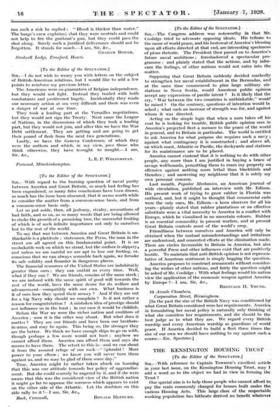_ {To the Editor of the SPECTATOR.] - _ Stn,—The
Congress address was noteworthy in that Mr. Coolidge tried to advocate opposing ideals. His tribute to the cause of world peace, and his bestowal of America's blessing upon all efforts directed at that end, are interesting specimens of pious rhetoric. The President then passed on to America's future naval ambitions ; foreshadowed a spectacular pro- gramme : and plainly stated that the actions, and by infer- ence the feelings, of other nations would not enter into the matter.
Supposing that Great Britain suddenly decided markedly to strengthen her naval establishment in the Bermudas, and at the same time commenced to plan large military air- stations in Nova Scotia, would American public opinion accept any expressions of pacific intent ? Is it likely that the cry, " War between the two countries is unthinkable," would be raised ? On the contrary, questions of intention would be asked ; what such an increase of strength was for, and against whom it was directed.
Acting on the simple logic that when a man takes off his coat he is looking for trouble, British public opinion sees in America's projected fleet a menace to the peace of the world in general, and to Britain in particular. The world is entitled to ask America for what purpose she requires such a navy ; against what contingency it is constructed-; and above all, on which coast, Atlantic or Pacific, the dockyards and stations for its maintenance are to be placed.
America cannot contend that it is nothing to do with other people, any more than I am justified in buying a brace of savage wolfhounds, permitting them to roam my property on offensive against nothing more lethal than blackbirds and thrushes ; and answering my neighbour that it is solely my own personal concern.
Last month, Popular Mechanics, an American journal of wide circulation, published an interview with Mr. Edison. His present work of trying to grow rubber in Florida was outlined, and, lest it might be thought that commercial ends were the only ones, Mr. Edison—a keen observer for all his years—plainly stated that rubber plantations or an effective substitute were a vital necessity to America in a conflict with Europe, which he visualized in no uncertain colours. Rubber is an essential commodity in present warfare, and at present Great Britain controls most of the world's crop.
Friendliness between ourselves and America will only be obtained when the mutual misunderstandings and irritations are understood, and concerted efforts at the elimination made: There are circles favourable to Britain in America, but also a powerful Press and other influences exist that are positively hostile. To maintain that anti-British opinion is not represen- tative of American sentiment is simply begging the question.
America proposes to construct armaments without consider- ing the wishes of other nations, and fairly the question might be asked of Mr. Coolidge : With what feelings would his nation view the application of the economic weapon against America by Europe ?—I am, Sir, &c., 11) Arcade Chambers, REGINALD II. YOUNG.
Corporation Street, Birmingham.
[In the past the size of the British Navy was conditioned by what Great Britain considered were her requirements. America in formulating her naval policy is naturally only thinking of what she considers her requirements, and she should be the best judge as to what they are. We regard every British warship and every American warship as guardians of world peace. If America decided to build a fleet three times the size of our own we should have nothing to say against such a course.—En. Spectator.]






































 Previous page
Previous page